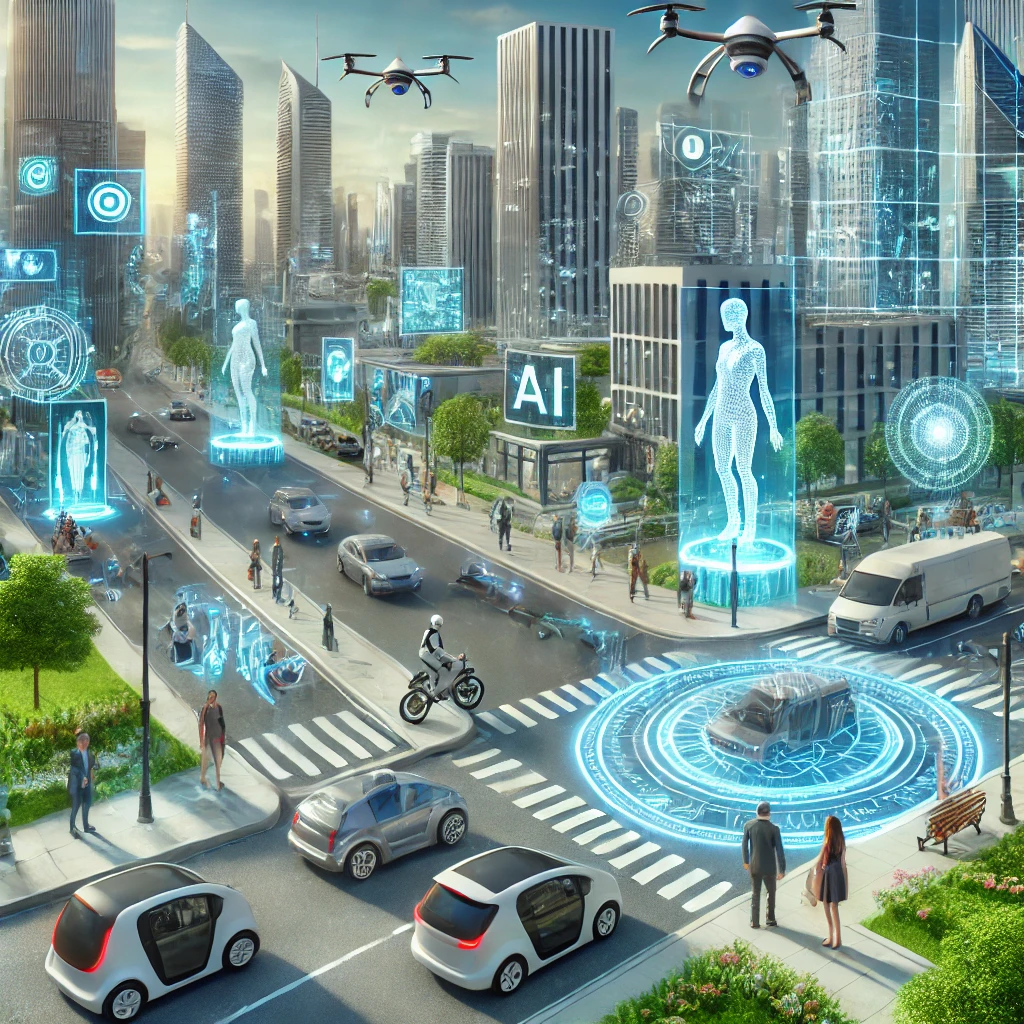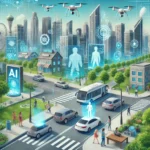Artificial Intelligence (AI) stands at the forefront of technological innovation, influencing myriad aspects of modern life. From healthcare and finance to transportation and entertainment, AI’s potential and challenges are vast and varied. This article delves into understanding AI, exploring how it works, its applications, and the significant implications it has on our world.
Understanding AI: The Basics
Defining AI
Artificial Intelligence refers to the creation of systems that can perform tasks typically requiring human intelligence. These tasks include learning from experience, understanding natural language, recognizing patterns, making decisions, and solving problems. Core components of AI include machine learning, deep learning, natural language processing (NLP), and robotics.
How AI Works
AI systems operate based on algorithms, which are sets of rules or instructions given to a computer to help it learn on its own. Machine learning, a subset of AI, involves training a model on large datasets. As the model processes more data, it improves its predictions and decision-making capabilities. Deep learning, a more advanced form of machine learning, uses neural networks to simulate human brain functions, allowing for more complex data analysis and pattern recognition.
Historical Evolution of AI
Early Beginnings
The concept of AI has been around since ancient times, but modern AI research began in the mid-20th century. Alan Turing, a British mathematician, laid the foundation with his question, “Can machines think?” His development of the Turing Test, which measures a machine’s ability to exhibit intelligent behavior equivalent to or indistinguishable from that of a human, marked a significant milestone.
Growth and Development
The 1956 Dartmouth Conference is often cited as the birth of AI as a field. Researchers like John McCarthy, Marvin Minsky, and Herbert Simon made significant strides in AI development. Despite periods of reduced funding and interest, known as AI winters, advancements in computing power and data availability in the late 20th and early 21st centuries have led to significant breakthroughs.
Applications of AI: Understanding Its Reach
AI in Healthcare
AI has revolutionized healthcare by improving diagnostics, treatment planning, and patient care. AI algorithms analyze medical images to detect diseases such as cancer at early stages, often with greater accuracy than human doctors. Virtual health assistants and chatbots provide patients with information and support, while predictive analytics helps in managing healthcare resources and planning treatments.
AI in Finance
In the finance industry, AI enhances fraud detection, risk management, and customer service. AI-driven algorithms detect suspicious activities by analyzing transaction patterns, thus preventing fraud. Automated trading systems execute trades at optimal times, and AI-powered chatbots handle customer inquiries, improving service efficiency and client satisfaction.
AI in Transportation
AI is transforming transportation through autonomous vehicles, traffic management systems, and logistics optimization. Self-driving cars, developed by companies like Tesla and Waymo, promise to reduce accidents caused by human error and increase mobility for those unable to drive. AI also optimizes route planning and traffic flow, reducing congestion and improving delivery times.
AI in Education
Educational technology, or EdTech, benefits greatly from AI. Intelligent tutoring systems provide personalized learning experiences by adapting content to individual student needs. AI also helps educators by automating administrative tasks and providing insights into student performance, allowing for more focused and effective teaching.
AI in Entertainment
AI enhances user experiences in entertainment by recommending personalized content. Streaming services like Netflix and Spotify use AI algorithms to suggest movies, shows, and music based on user preferences. In media production, AI assists in editing, special effects, and even content generation, pushing creative boundaries.
Understanding AI Implications
Economic Impact
AI’s ability to automate tasks poses both opportunities and challenges for the economy. While AI can increase productivity and efficiency, leading to economic growth, it also raises concerns about job displacement. Sectors such as manufacturing, customer service, and transportation are particularly vulnerable to automation, necessitating strategies for workforce transition and retraining.
Ethical and Social Considerations
The rise of AI brings several ethical and social issues to the forefront. Data privacy is a significant concern, as AI systems often require vast amounts of personal data to function effectively. Ensuring that AI systems are transparent and free from bias is critical to maintaining public trust. Additionally, there is an ongoing debate about the ethical use of AI in surveillance, military applications, and decision-making processes.
Legal and Regulatory Challenges
Governments and regulatory bodies worldwide are grappling with how to manage the rapid advancement of AI technologies. Developing comprehensive legal frameworks that address issues such as liability, intellectual property, and the ethical use of AI is crucial. International cooperation and standard-setting will play a key role in ensuring that AI development aligns with global ethical standards and human rights.
Environmental Impact
AI technologies can have a significant environmental footprint. Training large AI models requires substantial computational power, which in turn demands vast amounts of energy. This raises concerns about the carbon footprint of AI technologies and highlights the need for developing more energy-efficient AI systems. Additionally, AI can be harnessed to tackle environmental issues, such as climate change, through applications in renewable energy optimization and wildlife conservation.
The Future of AI
Advancements in AI
The future of AI holds immense promise with continued advancements in various subfields such as quantum computing, edge computing, and more refined neural networks. These advancements are expected to enhance the efficiency, capability, and reach of AI applications. For instance, quantum computing could exponentially speed up data processing times, making AI more powerful and capable of solving previously intractable problems.
AI in Solving Global Challenges
AI has the potential to address some of the world’s most pressing issues. In healthcare, AI could lead to breakthroughs in understanding and curing diseases. In environmental conservation, AI could help monitor ecosystems and predict natural disasters. Furthermore, AI-driven analytics could provide insights into sustainable agriculture and efficient resource management, helping to combat food and water shortages.
Interdisciplinary Collaboration
The future success of AI will depend significantly on interdisciplinary collaboration. Combining expertise from fields such as computer science, ethics, law, and social sciences will be crucial in developing AI technologies that are both innovative and socially responsible. This collaborative approach will ensure that AI advancements benefit society as a whole and mitigate potential risks.
FAQs on Understanding AI
What is AI and how does it work?
AI, or Artificial Intelligence, refers to systems designed to perform tasks that normally require human intelligence, such as learning, reasoning, and problem-solving. It works through algorithms and machine learning models that process large amounts of data to make predictions and decisions.
What are the main applications of AI?
AI is used in various fields, including healthcare (diagnosing diseases), finance (fraud detection), transportation (autonomous vehicles), education (personalized learning), and entertainment (content recommendations).
How does AI impact the economy?
AI can increase productivity and efficiency, leading to economic growth. However, it also poses challenges such as job displacement, necessitating strategies for workforce retraining and transition.
What ethical issues are associated with AI?
Key ethical issues include data privacy, algorithmic bias, and the ethical use of AI in surveillance and decision-making processes. Ensuring transparency and accountability in AI systems is crucial.
How is AI regulated?
AI regulation involves developing legal frameworks that address liability, intellectual property, and ethical use. International cooperation is essential for standard-setting and ensuring AI development aligns with global ethical standards.
What is the future of AI?
The future of AI includes advancements in machine learning, NLP, and robotics, potentially solving complex global challenges. Ethical, transparent, and inclusive development will be critical to maximizing AI’s benefits.
Conclusion
Understanding AI and its implications is crucial as we navigate the technological landscape of the 21st century. AI holds immense potential to transform industries, improve lives, and address global challenges. However, harnessing this potential responsibly requires a concerted effort to address ethical, social, and regulatory challenges. As AI continues to evolve, its impact on our world will undoubtedly be profound and far-reaching.
Contents:
Sources:
- AI and Ethics: Addressing the Challenges – Harvard Business Review
- AI in Healthcare: Transforming Patient Care – Mayo Clinic
Artificial Intelligence is not just a technological advancement; it’s a paradigm shift reshaping our world. From healthcare to education, business to entertainment, AI’s influence is pervasive, promising a future where technology and human ingenuity coalesce to solve complex problems and elevate our daily lives. As we navigate this transformative journey, understanding AI’s potential and challenges will be crucial in leveraging its benefits responsibly and ethically.


